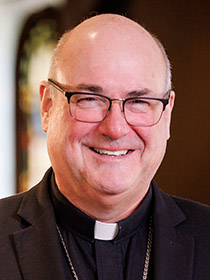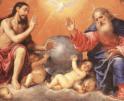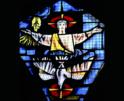
Faith
This Father's Day, give thanks for the fathers and grandfathers who chose to give themselves over to the service of their wives and families.

Henning
The 13th chapter of Paul's First Letter to the Corinthians, sometimes called "the hymn to love," is frequently chosen by couples for the readings at their wedding Mass. It is a good choice, as the famous passage speaks movingly of the qualities of love -- "Love is patient, love is kind" -- and its importance: "The greatest of these is love."
At the most basic level, though, Paul was not writing a letter for the Sacrament of Marriage; he was writing about the Christian life. He addressed a Corinthian community with a rather high opinion of themselves and their "spiritual gifts." In his letter, he reminds them that such gifts have no anchor nor purpose if they are not in the service of divine love: "If I speak in human and angelic tongues, but do not have love, I am a resounding gong."
Some commentators suggest that this poetic and deeply personal chapter of Paul's letter is autobiographical. Before his conversion, his zeal was harsh and angry. He engaged in violence against the disciples of Jesus in the conviction that he was doing God's work. When the Lord revealed to Paul both divine mercy and the summons to be an Apostle of the Lord, Paul was thrown into a crisis. After three years in Damascus with the Christian community he had hoped to persecute, Paul came to see how his sense of mission was twisted by the lack of love. He came to see God's love at work in the world and in his own heart by the love and grace of the Lord Jesus. Everything changed for Paul, and he used this emotional passage to pierce the hearts of the proud Corinthians.
In the hymn to love, he also speaks of the change in himself as a maturation: "When I was a child. . . ." The culture of Paul's day did not see children in the way of our culture. We see children in more sentimental terms and as a symbol of innocence. The ancients saw children as needing education and discipline to raise them to maturity. The emphasis was on their dependence upon others. And so, the poetic metaphor employed by Paul represents the maturing from a state of dependence to one upon whom others may now rely. Paul certainly became a reliable man, reliable in the service of God and a source of strength and wisdom for the people that he shepherded. Here, he links that dependability to the truth of divine love. It is, in fact, an aspect of love to be for the other a pillar of strength.
This weekend, we will honor the fathers of our communities. Contemporary culture sometimes speaks of manhood in terms of risk-taking and adventure. Advertisers tell men to continue behaving as if they are boys with no responsibility other than that search for adrenaline-fueled adventure. "Life is short; enjoy yourself," the culture tells us. The result of this arrested development is a world of too many fatherless children and too many broken promises. It is also a siren call that leaves too many men without true meaning or purpose in their lives.
This Father's Day, give thanks for the fathers and grandfathers who chose to give themselves over to the service of their wives and families. It may not be an adrenaline-pumping experience to play catch with a small child, but it is an exercise in reliability. The man who keeps his promises, the man who stays, is the man who gives that child a precious gift. He or she can rely on a dad who puts them first and places himself between them and the dangers and temptations of the world. Such a dad demonstrates faith, hope, and love and helps his children know the heart of God and the grace that flows from divine mercy and love. God bless our fathers and give them strength for their sacred calling.
- Archbishop Richard G. Henning is the Archbishop of Boston
Recent articles in the Faith & Family section
-
New comfort with old silenceMark T. Valley
-
'When I was a child'Archbishop Richard G. Henning
-
True Mission is Giving and ReceivingMaureen Crowley Heil
-
Glorious processionsScott Hahn
-
Scripture Reflection for June 15, 2025, Solemnity of the Most Holy TrinityFather Joshua J. Whitfield























